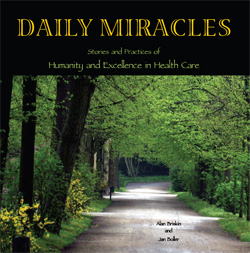

Buy from Amazon
Buy from Sigma Theta Tau International
* WINNER 2007 *
American Journal of Nursing
Book of the Year
Public Interest and Creative Works
Inside:
Excerpts
From the Introduction to Daily Miracles:
What Is Excellent Care?
by Gregory M. Coe, M.D.
What we do in health care is unbelievably complex. When you examine the processes carefully and begin to identify all the components that need to work together, it is amazing.
Those who work in the field are highly trained and extensively educated. The vast bulk of that training and education is focused on the technical and scientific aspects of what we do. Once you are well learned in the field, the technical stuff becomes fairly easy, almost routine at times. The real challenge comes when you put all of the science and technology into use with real people involved.
Patients come to us when they are vulnerable. They are frightened. They are in pain. They are overwhelmed. Their families and loved ones share those feelings. They all bring their dysfunctions and biases with them. They cannot be expected to be on their best behavior.
Our world, the world of healthcare, is mostly foreign and frightening to them. Having to be in the hospital takes away their power, their control. They fear losing their dignity. They look to us for help.
To be just the scientist or the technologist is mediocre. To really help our patients, we must provide more. This means going beyond what is expected or assumed that we can do and doing what is unexpected. It is not enough to just cure the infection or bandage the wound. We must care for the patient.
We must care for them as a whole person. We must provide care for who they are, not merely for the affliction from which they suffer. We can come to understand and care about who they are. We can touch and connect with them. We can protect, maintain, and if necessary, restore their dignity. This is excellent care.
This is one nurse’s story from Daily Miracles:
HELLO PROFESSOR
by Irene Arcibal , RN
I was taking care of Mr. M. in the critical care unit (CCU). Mr. M. was intubated and unable to wean. Every night I took care of him. He could not respond or even follow simple commands. If I’m lucky, he opened his eyes when I called his name, but still he will not follow any commands. I had the feeling that he had given up.
One night, after my assessment, I saw a black book on top of his night table. I thought it was a Bible, but it did not say so on the cover. Out of curiosity, I picked it up and took it to the desk. As I opened the book, I realized that it was a psychology book. To my surprise, the book was written by my patient! “Wow! My patient is a writer,” I thought.
I scanned through the pages until the last page, where it describes the author. Discovery, discovery, a great revelation indeed!
Mr. M. was a UCLA graduate with a master’s degree and had taught in Japan for four years. Afterward, he had been a professor at UCLA for several years. I couldn’t believe I was taking care of a professor.
I went into my patient’s room and softly said, “Hello professor!” He opened his eyes, grabbed my hands, and then tears started coming out of his eyes. He smiled at me and squeezed my hands.
I believe that at that moment, I gave back to my patient his individuality and possibly his whole life.
